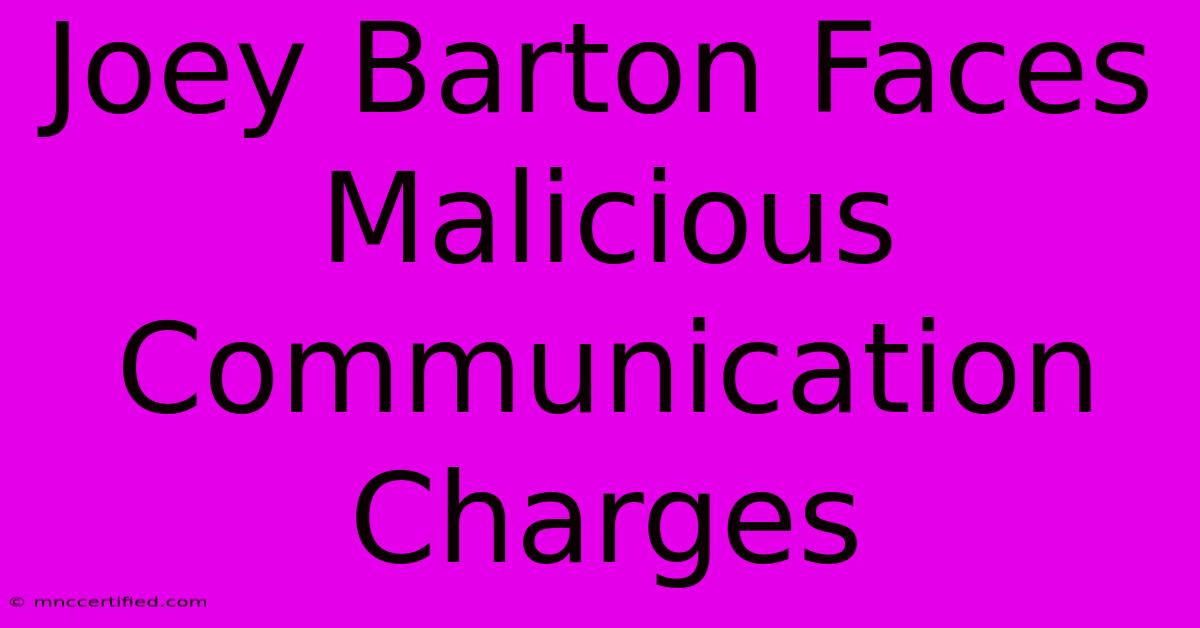Joey Barton Faces Malicious Communication Charges

Table of Contents
Joey Barton Faces Malicious Communication Charges: A Deeper Dive
Former footballer Joey Barton is facing charges of malicious communication, sending shockwaves through the sporting world and sparking intense media scrutiny. This article delves into the details of the case, examining the accusations, potential consequences, and the broader implications for individuals in the public eye.
Understanding the Charges: Malicious Communication
Malicious communication, a criminal offense in many jurisdictions, encompasses the sending of messages intended to cause distress, anxiety, or fear to the recipient. This can range from threatening messages to persistent harassment via various mediums, including text messages, social media, and emails. The specifics of the charges against Barton remain subject to ongoing legal proceedings, but the gravity of the accusations is undeniable. Key aspects to consider include the content of the alleged messages, the frequency of communication, and the demonstrable impact on the recipient.
What constitutes malicious communication?
The definition of malicious communication varies by jurisdiction. Generally, it involves proving intent to cause harm or distress. This is often established through evidence such as the content of the messages themselves, witness testimonies, and expert analysis. The prosecution must demonstrate beyond a reasonable doubt that the messages were sent and that they met the legal threshold for malicious communication. This requires a careful examination of the context and impact of the messages.
The Impact on Barton's Public Image
Barton's career has been marked by both highs and lows, both on and off the pitch. These new charges undoubtedly cast a shadow on his public image and could severely impact any future roles or endeavors. His reputation is already under significant strain, and the outcome of this case will be crucial in shaping public perception. The media's intense coverage further exacerbates the situation, amplifying the potential damage to his brand and career prospects.
The role of social media
In the digital age, social media plays a significant role in shaping public opinion. The accessibility of platforms like Twitter and Instagram means that accusations and allegations, even those unproven, can spread rapidly and reach a massive audience. This has significant implications for individuals like Barton, whose image is perpetually exposed to public scrutiny. The case highlights the risks associated with online communication, especially for high-profile figures.
Potential Consequences and Legal Ramifications
Depending on the outcome of the legal proceedings, Barton faces a range of potential consequences. These could include fines, community service, or even imprisonment. The severity of the sentence will depend on various factors, including the nature of the messages, the extent of the harm caused, and Barton's previous record. The case underscores the importance of responsible online behavior and the potential legal repercussions of engaging in malicious communication.
Lessons Learned: Responsible Online Conduct
This case serves as a stark reminder of the importance of responsible online communication. The ease with which messages can be sent and disseminated online does not negate the responsibility to act with consideration and respect for others. Individuals in the public eye, especially, must be acutely aware of the potential legal and reputational consequences of their online actions. This incident emphasizes the need for increased awareness and education surrounding online conduct and the potential for criminal prosecution.
Conclusion: Awaiting the Verdict
The case of Joey Barton highlights the serious implications of malicious communication in the digital age. As the legal process unfolds, the focus remains on ensuring a fair and just outcome. The case serves as a cautionary tale for everyone, emphasizing the need for responsible online conduct and the potential consequences of harmful behavior. The outcome will undoubtedly have significant implications for Barton’s future and will contribute to a broader conversation on online safety and responsibility. We will continue to monitor this developing story and update this article as new information emerges.

Thank you for visiting our website wich cover about Joey Barton Faces Malicious Communication Charges. We hope the information provided has been useful to you. Feel free to contact us if you have any questions or need further assistance. See you next time and dont miss to bookmark.
Featured Posts
-
Vanuatu Earthquake Dozens Dead
Dec 18, 2024
-
Sam Fenders Glasgow Gig Cancellation News
Dec 18, 2024
-
Mishal Husain Ends Today Programme
Dec 18, 2024
-
Mc Coists Phone Call To Menzies
Dec 18, 2024
-
Athletics Star Wins Bbc Spoty
Dec 18, 2024